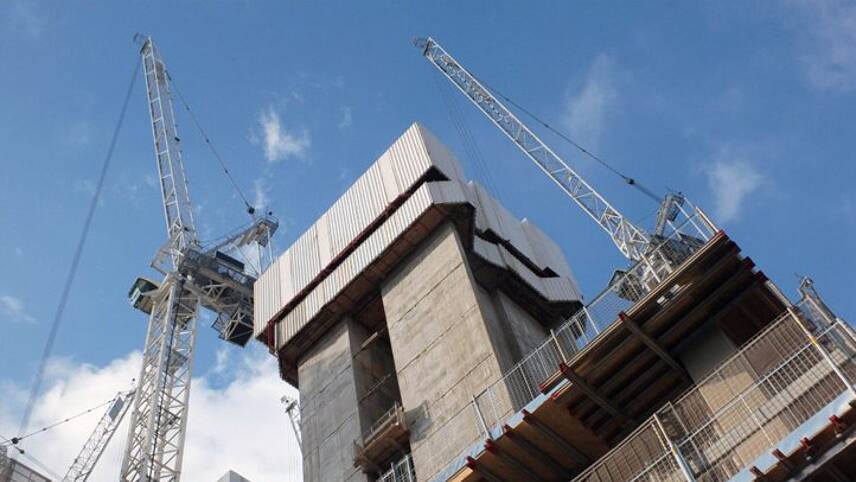Register for free and continue reading
Join our growing army of changemakers and get unlimited access to our premium content

The Treasury has costed the UK's Covid-19 recovery package at £160bn. Since lockdown began
Building on the Summer Economic Update, which earmarked £3bn for energy efficiency schemes for the housing sector, the new funding will be spent to help decarbonise hard-to-abate sectors like construction, heavy industry and transport in line with the UK’s 2050 net-zero target.
The first £400m proportion of the funding, announced late on Tuesday (21 July) by the Department for Transport (DfT), consists of £200m from central Government coffers and £200m from the aviation industry. It will be allocated to projects developing SAF, energy-efficient electric aircraft components, high-performance engines and wing designs intended to minimise fuel consumption.
Earlier this week, MPs called for the DfT and Treasury to provide £500m of funding for SAF alone, claiming that such a move would generate £2.7bn for the national economy while supporting 19,000 jobs through to 2035.
Today (22 July) saw Boris Johnson confirm a further £350m of investment in low-carbon technologies, this time across the industrial, construction and materials sectors.
Of the pot, £139m will be used to abate emissions from the heavy industry sector. Investments will be made to scale-up the UK’s hydrogen production capacity and to improve related infrastructure; and to bring CCS technologies online at scale. The Conservative Party Manifesto notably includes a commitment to spend £800m on CCS during the course of this Parliament and, under Theresa May, BEIS pledged to bring the UK’s first major CCS project online in the mid-2020s.
According to the Committee on Climate Change (CCC), hydrogen and CCS are both “non-optional” components of the UK’s transition to net-zero.
£149m, meanwhile, will be spent to drive the use of innovative low-carbon materials in the heavy industry sector – £66m from central Government and £83m from the private sector. UK Research and Innovation (UKRI) has opted to allocate funding packages to companies working to incorporate ash and other by-products into new materials; to use AI and robotics to maximise efficiency in the foundation industry sector, and to pioneer energy-efficient processes for extracting precious metals and minerals from products and materials with mixed compositions.
Around 10% of the UK’s annual emissions are attributable to the foundation industry sector, which accounts for 75% of materials in existence in the national economy.
Smaller funding packages of £36m, £15m and £10m will be allocated to the construction, space and automotive sectors respectively. Of the construction sector funding, the majority (£26m) will be spent to improve building techniques, while the remainder will be spent on digital technologies that seek to improve productivity and build quality while reducing emissions and raw materials use.
Johnson timed the unveiling of the funding to coincide with his anniversary as Prime Minister and said that it proves his Government’s green ambitions “remain sky high”.
“We’ve made great strides towards our net zero target over the last year, but it’s more important than ever that we keep up the pace of change to fuel a green, sustainable recovery as we rebuild from the pandemic,” he said.
“The UK now has a huge opportunity to cement its place at the vanguard of green innovation, setting an example worldwide while growing the economy and creating new jobs.”
Green economy reaction
The announcement comes less than a month after Johnson’s ‘build, build, build’ speech – his first public commitment to post-Covid-19 recovery spending – was heavily criticised by key figures across the UK’s green economy.
Responding to the new funding, the Aldersgate Group’s policy manager Ana Musat said it “rightly” addresses industries where “making progress to cut emissions is both difficult but also essential if the UK is to have an economic recovery with an ambitious climate programme at its core”.
“Beyond R&D funding, decarbonising hard to treat sectors like heavy industry or aviation will need to be achieved by and large through private investment, which itself will require clear policy signals before it is committed,” Musrat said.
The Aldersgate Group is notably calling for the publication of a robust carbon price trajectory for the 2020s, in which pricing gradually increases. It is also urging stricter mandates around product standards, covering factors such as embodied carbon, energy efficiency and recycled content.
edie’s content editor Matt Mace recently penned a blog summarising the R&D investments and green policy interventions made by the UK Government since the 2050 net-zero target was enshrined in law last summer. You can read that piece in full here.
Sarah George


Aviation can be turned green with zero fossil hydrocarbons produced by the well know Fischer Tropsch process that can be used to capture CO2 from the air and combine it with hydrogen using zero carbon electricity. Karlsruhe Institute of Technology has a demo unit to show it works.
See: https://www.imvt.kit.edu/454_1339.php
Steel production can be done with hydrogen.
Suggest like all other media outlets edie need to fact check the lies which come out of this Govt these figures keep getting repeated
Main stream press are not doing their job